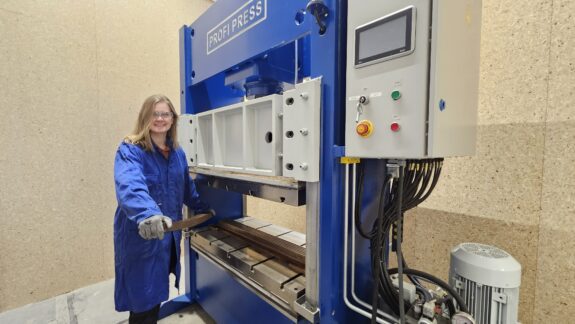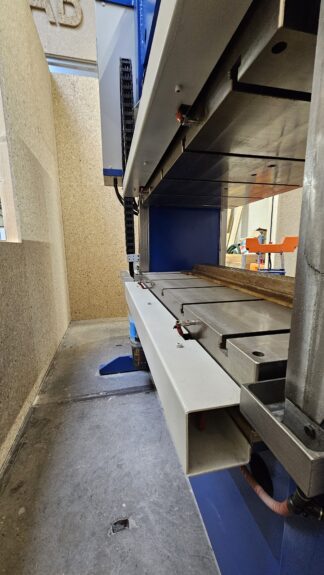Heat, volume and power. That’s what Jasper Sluis and Annine Rozema needed when they were looking for a new press for the MNEXT Center of Expertise (part of Avans Hogeschool) in Den Bosch, where they both work. They found a Profi Press Hydraulic Press with a capacity of 100 tons and heated platens at RHTC in Schaijk. This RHTC heated platen press is now being used for practical research on biobased materials.
Annine Rozema uses the RHTC heated platen press with a capacity of 100 tons for practical research on biobased materials. Source: Metaalnieuws.
Terrace boards made from grass, panel materials based on mycelium (fungal threads), shower tiles made from mussel shells. These are just some of the products that the MNEXT staff, in collaboration with companies and students, conduct applied research on. Such examples may sound experimental, but they certainly are not. Some biobased materials are already being widely used in construction.
Producing Traffic Signs with this RHTC Heated Platen Press
Jasper and Annine can readily provide examples of concrete applications: there is already a company in our country that makes traffic signs from biocomposites instead of the usual aluminum. Just a few hundred meters from their workplace, there is a lightweight biocomposite bridge that has replaced a much heavier steel one. They have contacts with a major construction company that is looking for an alternative to steel foundations under houses.
And some cars now have flax screens that do not resonate and are also strong and lightweight. “The transition is in full swing,” says Jasper. “Many parties are looking for sustainable solutions, so innovation is happening quickly. Moreover, we notice in this school environment that the younger generation is very engaged in these developments.”
Accelerating Material Transition
Jasper is the project leader for biobased construction at MNEXT, while Annine is a researcher on biobased materials. MNEXT is involved in the material transition and aims to accelerate it. Therefore, it provides space for practical research with students, teachers, and researchers. The MNEXT Greenlab in Den Bosch is a practical working environment where the business world, education, and research collaborate on issues related to biobased materials.
RHTC is familiar with the concept of heat presses and was able to provide MNEXT with a custom-made press equipped with a heating plate that is electrically heated. Source: Metaalnieuws.
The two speak enthusiastically about their work. “Many materials that we currently discard as waste are perfectly suitable for making usable products,” says Annine. She mentions the grass mowed from the roadside and the corn stalks that are discarded during corn harvesting. She and Jasper prefer not to use the term “waste” at all. “These are residual streams that can be an excellent alternative to the currently conventional raw materials.”
Professional Hydraulic Press
That’s what MNEXT is researching, and for that, a good, professional press is needed. Until recently, they had to make do with a small heat press, which was more for measurement than pressing. For actual research, Annine had to use a press at another institution. “We simply needed a serious press, especially because we had several projects ongoing.”
They have now purchased a Profi Press from RHTC, a supplier of high-quality hydraulic presses, mechanical presses, punching machines, and profile bending machines, all produced in Europe. It has a capacity of 100 tons – more than sufficient for biocomposites – and a large construction format. “It’s a universal press that will serve us well for our research in the coming years,” says Jasper. “Moreover, it’s an impressive machine. When you see it, you’ll be eager to use it.”
Heated Platen Press
The most important aspect of the machine is that it is a heat press that can be heated up to 200 degrees Celsius. RHTC is familiar with the concept of heat presses and was able to provide MNEXT with a custom-made press equipped with a heating plate that is electrically heated. This is necessary because the biomaterials placed in the molds are mixed with resin and binders. These harden through temperature. The resin becomes liquid in the press, is heated, and then pressed. The press is always warm during use, so the people operating it must wear protective clothing.
The press was installed just before the summer vacation. Annine and Jasper are very satisfied with both the machine and the supplier. “We received good instructions on how to operate it, and RHTC also helped with the financing. They support this research.”
Most of the presses sold by RHTC are used for processing steel. Jasper would also like steel processors to be aware of the development of biobased and other alternative materials. These developments are undeniable. The sustainability trend is ongoing and encouraged by European regulations. Pricing of CO2 emissions will lead to alternatives for metals. “Steel processors need to consider where they stand with their product. What are the opportunities and threats?”
A practical example like the one with traffic signs made from biocomposites instead of aluminum can bring about a change. Companies with interest or questions are welcome to contact us or visit us. I would say, go out, explore, and investigate. Do you really need to use metal for a van or can it be made from biocomposite? The same applies to, for example, a cover on a barrel. A biocomposite lid can likely be produced with much less CO2 emissions than a metal one, and you don’t need a crane to move it because biocomposite is lighter. Here at MNEXT, we are happy to make a case out of it!”
Source article (original in Dutch) and pictures: Metaalnieuws

